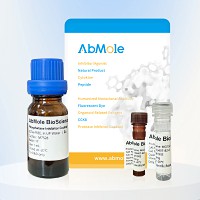All AbMole products are for research use only, cannot be used for human consumption.

Macrophage colony stimulating factor (M-CSF), also known as colony stimulating factor-1 (CSF-1), is a hematopoietic growth factor. It can stimulate the survival, proliferation and differentiation of mononuclear phagocytes, and can stimulate the proliferation and movement of macrophages. M-csf is mainly produced by monocytes, macrophages, fibroblasts and endothelial cells. The interaction of M-CSF with its receptor C-FMS is associated with growth, invasion, and metastasis in a variety of diseases, including breast cancer and endometrial cancer.
Measured in a cell proliferation assay using Murine M-NFS-60 cells, the ED50 is < 3.0 ng/ml, corresponding to a specific activity of > 3.3 × 105 units/mg.
Accession # P07141
Protein Construction: M-CSF (Lys33-Pro187)
Endotoxin: < 0.2 EU/μg
Apparent Molecular Weight: 35~44 kDa
Lyophilized after extensive dialysis against PBS.
BMDMs were isolated from adult (8–10 week old) female C57BL/6 mice. After euthanasia, femurs were removed and stripped of muscle, exposed bone was washed in 70 % EtOH and rinsed with RPMI media (with 1 % penicillin/streptomycin) (RPMI-PS). Bone marrow cells were flushed from bone shafts into fresh RPMI media with 1 % penicillin/streptomycin and 10 % FBS (cRPMI) and then manually separated with two 23-gauge needles. Cells were pelleted by centrifugation at 300 g for 7 min and 4 °C, and the cell pellet was resuspended in 5 ml red blood cell lysis buffer (M58116). Next, RPMI-PS was added to the cell solution and centrifugation repeated. The cell pellet was washed twice with RPMI, resuspended in cRPMI and plated at a density of 2 × 107 cells/dish in 60 ml of cRPMI media supplemented with 20 ng/ml of M-CSF (M11486). After 3 days, half the volume of media was replaced. After four additional incubation days, cells were washed with PBS and 3 ml of non-enzymic cell dissociation buffer was added. Following 10 min at 37 °C and 5 % CO2, cells were removed, centrifuged at 300 g for 7 min at 4 °C and then plated for infection or lipopolysaccharide (LPS) stimulation.
| Form | Lyophilized powder |
| Solubility (25°C) | Reconstitute the lyophilized powder in ddH2O or PBS up to 100 μg/ml. |
| Storage | Stored at ≤ -20°C, stable for one year after receipt. Reconstituted protein solution can be stored at 2-8°C for 2-7 days and at -20°C for 3 months. |
| Related Cytokines and Growth Factors Products |
|---|
| Recombinant Human GDF-15 Protein (HEK293 N-hFc)
Growth-differentiation factor 15 (GDF15), also known as MIC-1, is a secreted member of the transforming growth factor (TGF)-β superfamily. GDF-15 has a role in regulating inflammatory and apoptotic pathways in injured tissues and during disease processes. GDF-15 overexpression arising from an expanded erythroid compartment contributes to iron overload in thalassemia syndromes by inhibiting hepcidin expression. |
| Recombinant Human FGFR1 Protein (HEK293, C-His)
FGFR1, also known as CD331, is a full-length representative protein consists of an extracellular region, composed of three immunoglobulin-like domains, a single hydrophobic membrane-spanning segment and a cytoplasmic tyrosine kinase domain. |
| Recombinant Human FGFR2 Protein (HEK293, C-His)
FGFR2, also known as CD332, acts as cell-surface receptor for fibroblast growth factors and plays an essential role in the regulation of cell proliferation, differentiation, migration and apoptosis, and in the regulation of embryonic development. FGFR2 plays an essential role in the regulation of osteoblast differentiation, proliferation and apoptosis, and is required for normal skeleton development. It also promotes cell proliferation in keratinocytes and imature osteoblasts, but promotes apoptosis in differentiated osteoblasts. |
| Recombinant Mouse BMP-4 Protein (E. coli, C-His)
Bone Morphogenetic Protein-4 (BMP-4) is a critical signaling molecule required for the early differentiation of the embryo and establishing of a dorsal-ventral axis. BMP-4 is secreted from the dorsal portion of the notochord, and it acts in concert with sonic hedgehog to establish a dorsal-ventral axis for the differentiation of later structures. |
| Recombinant Human Coagulation Factor X (HEK293, C-Fc)
Coagulation factor X, belongs to the peptidase S1 family. Coagulation factor X is initially synthesized in the liver. Coagulation factor X is a vitamin K-dependent glycoprotein that converts prothrombin to thrombin in the presence of factor Va, calcium and phospholipid during blood clotting. |
All AbMole products are for research use only, cannot be used for human consumption or veterinary use. We do not provide products or services to individuals. Please comply with the intended use and do not use AbMole products for any other purpose.


Products are for research use only. Not for human use. We do not sell to patients.
© Copyright 2010-2024 AbMole BioScience. All Rights Reserved.
